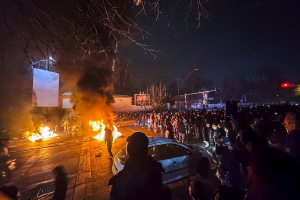Why Does God Allow Hurricanes?
The shortest sermon I ever heard was delivered whimsically.
On a Sunday night, many years ago, an associate pastor of a popular mega-church got up to preach. He said that the topic of his sermon was, "Why Do Bad Things Happen to Good People?" Then he said, "The answer to that question is very simple: There are no good people." Then he pivoted and began to walk away.
A half minute later, he returned to the pulpit and delivered his actual message. I don't remember a word of what followed, but I've never forgotten his humorous prelude.
With Hurricane Isaac causing some havoc and threatening a lot more (as of this writing, it seems to be following the path of Katrina), we remember again the problem of reconciling a good God with suffering.
Some politicians have weighed in on the hurricane, tying it into the Republican Convention in Tampa. On August 24, US Congressman Danny Davis (D-IL), told WLS radio in Chicago, "Well, it means that the gods are favoring Democrats. Not that we wish any kind of difficulty in terms of the weather." The next day, former Michigan Governor Jennifer Granholm tweeted, "R convention delay due to Isaac: I guess God has ways to shut the whole thing down."
When it looked like the GOP convention was going to be spared and New Orleans might be hit, actor Samuel L. Jackson tweeted in a profanity-laced message on Monday that it was "unfair." And an actress tweeted a message, also with swearing, regretting that Isaac wasn't going to wash away the pro-lifers, et al, into the ocean.
All politics aside, how could a good God allow hurricanes or other forms of natural disasters?
This is a core question that keeps resurfacing. Presumably, it is part of what keeps some from believing the Gospel of Jesus Christ.
There's only so much you can say in this type of forum. But here are a few observations I make, as a student of the Bible and as a student of history.
1) Ultimately, we don't know why God allows these things. His ways are not our ways.
The whole book of Job deals with the issue of Job's suffering-why did God allow it? Throughout the book, Job's "friends" or "comforters" insist he must be guilty of secret sin; otherwise he wouldn't be going through all this pain. Job maintains his integrity throughout the ordeal, but does question God's justice in all this.
At the end of the book, God rebukes Job's comforters. But He also asks Job many pointed questions, such as, "Where were you when I created the heavens and the earth?" Over and over, for four chapters, God puts Job in his place. He also says words to this effect: Will you condemn Me to justify yourself? That's precisely what many do today.
2) We live in a fallen world. Fallen because of humanity's sin. Bad stuff happens to everyone. So does good stuff. Someone once said, "The real question isn't, 'Why do bad things happen to good people? But, why do good things happen to bad people?'" In any event, hurricanes are a reminder that things are not right between us and the Creator. Jesus said the rain falls on the just and the unjust.
Despite the hurricane, or anything bad that may come our way, faith can provide comfort. Even in the midst of the storm, God can help. It's reported that minutes before Dr. Martin Luther King, Jr. was shot on that hotel balcony in Memphis in 1968, he was requesting the hymn, "Precious Lord, Take my Hand," to be sung at that night's meeting.
The words are instructive: "Precious Lord, take my hand. Lead me on; let me stand. I am tired; I am weak; I am worn. Through the storm, through the night, lead me on to the light. Take my hand, precious Lord, lead me home."
Come what may, even a hurricane, faith in the Lord produces endurance, even in very difficult circumstances. As is often said, "There are no atheists in foxholes."
3) Christ experienced suffering on the cross for the sake of our salvation. To paraphrase the late Dr. D. James Kennedy, Jesus experienced the hurricane of God's wrath when He died for sinners. So in Jesus, the God of the universe experienced things even worse than a hurricane, so that He might secure our salvation. We are blessed to know that Christ will never leave or forsake us during our time of suffering.
4) Believers can bring glory to God's Name through the storm. And when the storms are over, we can provide needed help. Frankly, millions of faithful Christians rise to the occasion, storm after storm. Even an atheist marveled at this. When Hurricane Katrina hit, skeptic Roy Hattersley wrote an editorial for the UK Guardian (9/11/05), in which he said of the groups providing post-hurricane relief: "Notable by their absence are teams from rationalist societies, free thinkers' clubs and atheists' associations-the sort of people who not only scoff at religion's intellectual absurdity but also regard it as a positive force for evil."
He added, "… faith comes with a packet of moral imperatives that, while they do not condition the attitude of all believers, influence enough of them to make them morally superior to atheists like me." I appreciate his honesty.
A hurricane might be a wake-up call from on high, and when (and if) it comes, I hope you'll join all those of good will who will do what they can to improve the circumstances for those hurt and needy.



























